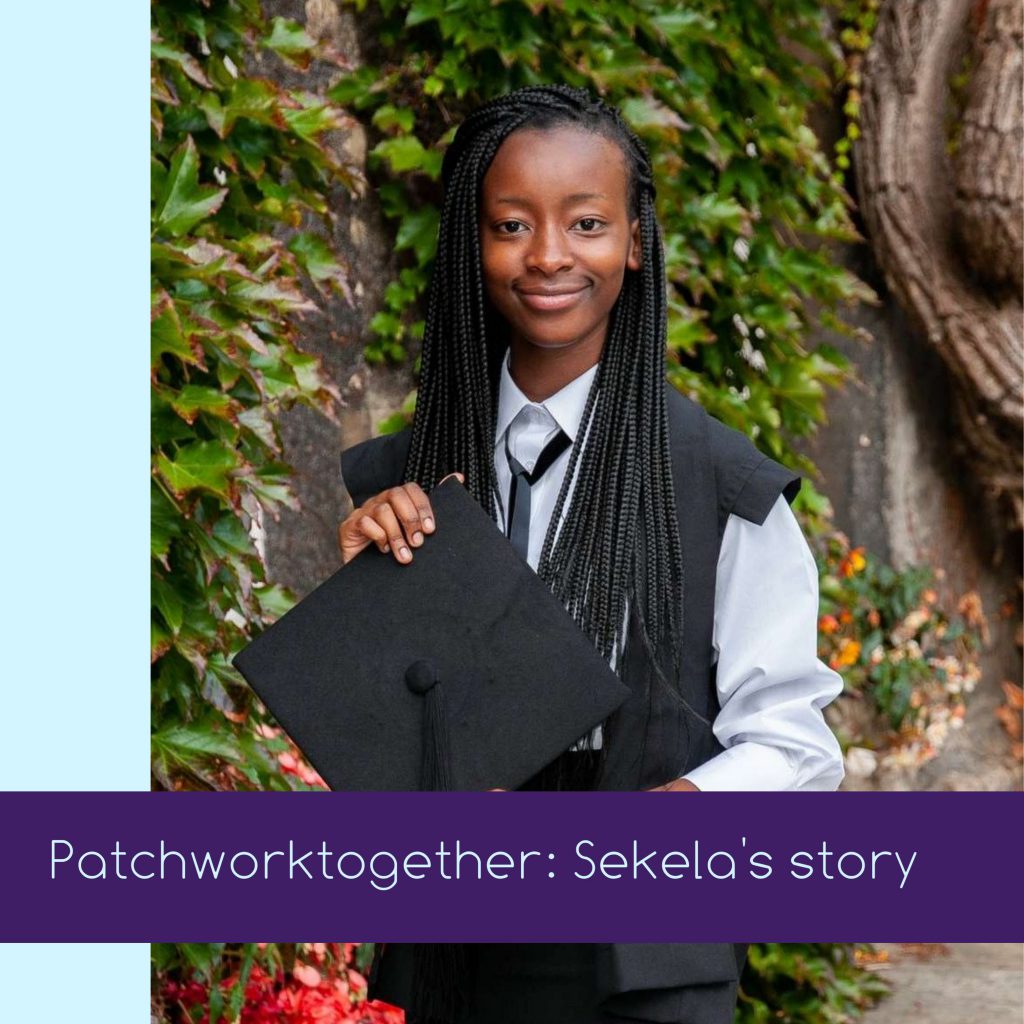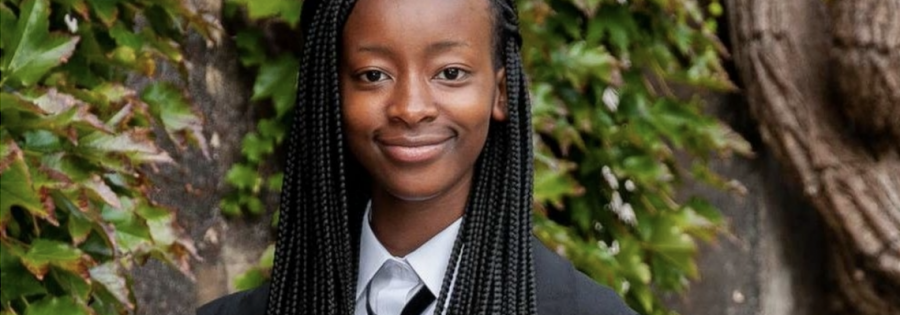-
Blog Views
996
Patchworktogether Spotlight: Sekela’s Story
We spoke to Sekela Ngamilo, a 20-year old law student from London. Sekela tells us about acting, epilepsy and the potential positive effects of lockdown for those with chronic health conditions.
“There’s always the fear that people’s misconceptions mean I won’t get hired, but on the flip side I can’t not tell people, and I know that it shouldn’t be seen as a burden. Over time, it has become something I’ve grown comfortable with and am happy to do. Discrimination comes when people don’t understand, so the more we can increase awareness, the better.”
What is your story with chronic illness?
Around the time of my A-levels, I began having seizures but had no idea what they were. Doctor’s appointments seemed to lead to dead ends, so I continued with my exams until a severe seizure led to a trip to A&E and finally a diagnosis. In the middle of my exams, I found out I had temporal lobe epilepsy.
I was put on strong medication and realised my life was not going to be quite the same. Temporal lobe epilepsy causes me to have amnesia after my seizures meaning that I don’t remember that I have them or when I’m in a postictal state (how a person is after a seizure). At times I could have one or multiple and end up somewhere with no idea how I got there. Despite the amnesia, I knew I was having seizures mid-exam; I would look up at the clock, blackout and look up again and a whole twenty minutes would have passed. I could no longer commute alone, go on nights out, stay up late, or take part in certain activities. My life took on a new rigidity: I now had to keep track of where I was and what I was doing and stick to a routine to accommodate the heavy medication I was now taking.
My place at the University of Oxford was hinged upon these exams, but it was not until I was two-thirds of the way through that I was allocated extra time. Not only had I lost my independence, but I felt I had suddenly lost the intelligence and abilities by which my whole academic trajectory had been guided.

“I’m Sekela, a student who enjoys acting, art, knitting, boxing and dance.”
How did your condition affect your relationships?
My epilepsy added a whole other dimension to my relationships. I was having to try and understand my seizures through what other people were telling me, which in itself was scary because epilepsy is a hugely misunderstood condition: most people think epilepsy means suddenly dropping to the ground and having seizures. This just isn't true, so the people around me were attempting to understand it as much as I was.
Something which helped was making friends in similar situations, especially when I started university. I met people who also had epilepsy or other chronic illnesses, both through Epilepsy action (an organisation providing support) and my church. It helped me to feel human again.
You have experience in the acting industry- how did having epilepsy impact trying to secure work?Before my diagnosis, I had a seizure on the set of a short film I was working on. We had just finished filming a scene in which I had been swimming, and remember sitting in the changing room with everyone crowded around me. What sticks out is the support I was surrounded by and the increased mindfulness that followed.
On a separate occasion, however, I was asked by a casting director “how did you relate to this character?” When I explained that I was able to understand the character through my experience of epilepsy, everyone in the room’s faces dropped. I knew at that moment that there was no chance of me landing the job.
Being in the later stage of the audition process brings conflicted feelings when it comes to being open about my epilepsy. There’s always the fear that people’s misconceptions mean I won’t get hired, but on the flip side I can’t not tell people, and I know that it shouldn’t be seen as a burden. Over time, it has become something I’ve grown comfortable with and am happy to do. Discrimination comes when people don’t understand, so the more we can increase awareness, the better.
When it comes to the world of work and chronic health issues, what needs to change?
Because of the misconception that epilepsy is just one type of seizure and the lack of recognition that epilepsy can be controlled once people have found the medication that works for them, there is a general idea held that people with epilepsy can’t work. In some cases this is true, but in many, it isn’t, and many people's seizures are not controlled because of the lack of research and funding when it comes to epilepsy. Although we are blessed with a vast amount of technology which can help (MRIs might not be fun, but they are useful) there seems to be a lack of government incentive for epilepsy research itself. In Billy Caldwell’s case (a boy whose seizures were controlled by cannabis oil) for example, it seemed that there was more concern about crime than there was care about people’s actual lives and their ability to function.
My consultant is an angel- he doesn’t view his patients simply as epileptics, he sees them as people who have epilepsy, and asks me about other things going on in my life and how they might be contributing to the seizures. The world, employers included, need to see people with epilepsy as just that - people.
What advice would you give to someone with epilepsy who wants to work?
Remember that you have a lot of strength- strength that comes from your experience with epilepsy. When an interviewer or an application form is asking about a time when you've shown resilience, think of the times you were stressed out but did not let your epilepsy or the chronic condition you are dealing with prevent you from doing things. Always remember that you’ve achieved things in spite of that.
I also think the current lockdown situation affords a lot of opportunity for optimism. Seeing how many major corporate workplaces have tailored things to make working from home productive means those who need care or can’t work in an office every day could have a lot of doors opened. You could be part of a law firm or consultancy firm without having to leave the house.
Tags
All Tags
Ability Connect Academy for Disabled Journalists Academy for Disabled SEO Specialists Access2Funding Accessibility Accessibility information Accessibility int he workplace Accessibility ramps Accessible education Accessible locations Accessible places Acid reflux Adaptive fashion Advocacy AI Aleto Foundation All Saints Alt text Aspiring Entrepreneurs with Disability Development Programme Assistive technology Autism Awareness Barriers Beth Kume-Holland Blog Budgeting Bullying BUPA Burnout Business Business Disability Forum Business model creation Business skills Business workshop Businesses Cancer Candidates Captions Cash flow Cerebral palsy Characters Charity Charity sector Chronic pain Closed captions Clothes Clothing Cognitive disabilities Comfort zone Communication Community networks Companies Company Company Corner Company culture Confidence Confucius Consultant Consultation Content creator Content designer Data talent Diagnosis Difference Digital and social media marketing Digital transformation Disabilities Disability advocate Disability advocates Disability and Neurodiversity Network Disability awareness Disability Awareness Training Disability community Disability confident Disability Confident Leader Disability employment Disability inclusion Disability news Disability Policy Centre Disability Pride Disabled Disabled candidates Disabled community Disabled founders Disabled people Disabled People’s Direct Action Network Disabled talent Disabled team Disabled-led Diverse Diverse workforce Diversity Diversity and inclusion Diversity Project Diversity Recruitment Platform Domestic violence Dysfluency ED&I EDDP Education Education and resource platform Employment opportunities Employment platform Empowerment Equality Act 2010 Ethnic minorities Eventbrite Expert teachers Expert training Fashion Fashion industry Fathom Feedback Finances Financial goals Financial planning Financial plans Financial services Financial services sector Flexible work Freelance FTSE 100 Fund management GAIN Game Gaming Gareth Walkom Garment technologist Gastrointestinal conditions Gem Turner Gender Gender Networks Grant Logan Guide dog Healthcare Hidden talent pool Homeworking Hospice UK Compassionate Employers Programme HR Hybrid working Ian MacKenzie Inclusion Inclusive culture Inclusive workforce Inclusivity India Inspiration Intellectual capabilities Interview process Interviews Investments Invisible disabilities Invisible disability Isaac Harvey Isaac Harvey MBE Istituto Marangoni Jack Wills Job descriptions Job interviews Job opportunities Job vacancies Journalism Journalists Learning disability Leeds Leeds trinity university Legislation LGBT Great LGBTQ+ Limb-pelvic hypoplasia LinkedIn LinkedIn influencer Listening service Lloyds Bank London London Fashion Week Long-term health condition Long-term health conditions Mapping days Mark Esho Matt Pierri Maya angelou Meta Metaverse Migrants Motivation Multinational firm Musculoskeletal conditions National Council for the Training of Journalists NCTJ Neurodivergence Neurodivergent Neurodiverse Neurodiversity consultant Neurodiversity space Neurotype Neurotypes New Delhi News Non-disabled founders Non-profit Novos OBS Occupational health Office environment Organisations Partially sighted Partnership Patchworkers People Phase Eight Phone calls Physical disabilities Pirate video games Policy Poverty Presentations Pride Network Primark Processes and systems Professional Women’s Network Progress Together Public speaking Puneet Singh Singhal Race Race and Ethnicity Network Raising awareness Registered blind Remote course Remote education Remote learning Remote work Removing barriers Resilience Revenue streams Rights School Scoliosis Scope Search engine optimisation Selection process Self-employed Self-employment Senior staff Sexuality Shaw trust Shaw trust power 100 list Sign language SJP Small Business Britain Social impact Social mission Social mobility Social-emotional learning Social-emotional learning platform Software Speaking situation Speech differences Speech disabilities Speech impediment Spotlight series Spotlight stories Ssstart St. James’s Place Charitable Foundation Staff Stammer Stammering Stonewall Stories Stuttering Sustainable change Sweaty Betty Target market Tech industry Tech talent TEDx Tesco Think tank Training Underrepresentation Unhidden Unhidden Clothing Universities University of Leicester Vanessa Castañeda Gill Victoria Beckham Video editor Video game Vimeo Violence Virtual reality VR Wealth management Web accessibility Wheels and Wheelchairs Women Work environment Work from home Working conditions Working Families Group Working from home Workplace adjustments Youth Zoom Abc Ability Today Access to work Accessibility in the workplace Accessibility test Accessible work Acting Adhd Adjustments Administrative Adrian lord Advice Advocacy and campaigns Allparty parliamentary group for inclusive entrepreneurship American civil rights movement Android Anglonorman App Artificial intelligence Bad grammar Barriers to work Bbc Benefits Blind persons act Blue badge Blue badge service specialists Care Career Carer Celtic languages Center on everyday lives of families Ceo Cfs Chloe tear Chronic fatigue syndrome Chronic health condition Chronic illness Commodo aute beatae Community Community story Community, community story, founder, feature, accessible work, disability employment gap, making a difference Companies house Compressed hours Computer science Computers Coronavirus Councils Covid19 Crystal mark standard Deaf Design Dialects Dictionary Digital accessibility Disability Disability discrimination act Disability employment gap Disability rights movement Disability services Disabled peoples direct action network Disabled persons employment act Disabled-led organisation Easy read Edit Tag Test 2 Email address Employer Spotlight Employers Employment English English speakers Entrepreneur Entrepreneurship Epilepsy Equality Equality act Equality and diversity Equality of access Esources, disability, disability services, support services, community story, features, adjustments, social support network Esse vero eum nisi a Eugenics Facebook Feature Features Fibromyalgia First world war Flexi Flexible working Flexitime Flextime Founder Francesco cirillo Freelancing French Gcses Gdpr General data protection regulation Good Good grammar Google Government policy Government support Graduate Graduates Grammar Grammar schools Health Health condition Health conditions Hearing impairment Help And Support Tags History History of language Holistic Ico Impact Imposter syndrome Inclusive entrepreneur network Inequalities Inequality Information commissioners office Information governance Instagram Internet Jacqueline winstanley Laborum Magna moles Language Latin Law Learning difficulties Lexicographers Limited company Local councils Local government Making a difference Marketing strategy Mecfs Medical conditions Medical model of disability Medical vs social models of disability Medicines Mental health Middle english Mindfulness Mlm Mobility issues Molestias quod sapie Multilevel marketing Nam eaque iure aut v National league of the blind Neurodiversity Nihil corporis aliqu Niya Normans Old english Old french Onboarding and retention Online Out of work Oxbridge Parent Passwords Patchwork hub Payment details Planning Planning for work Podcasts Pomodoro Preposition Private schools Psychiatric Psychiatry Punctuation Qui voluptatem debi React Reasonable adjustments Recruitment Remote working Resources Resources and support Rest Retinopathy of prematurity Sales Scam Search engine Second world war Shell shock Slang Sociability Social Cipher Social interactions Social media Social model of disability Social support network Socialising Spelling Spoken language Spotlight series Spotlight stories St. James’s Place Standard english Startup State schools Student Students Studying Suffragette movement Support Support services Syntactician Syntax Tag Technology The Disability Policy Centre The elderly Then barbara met alan Trafalgar square Turkish United nations Universal inclusion University University of arts london University of cambridge University of hertfordshire University of hull University of leeds University of oxford Victoria Jenkins Visual impairment War Ways of working West germanic dialects William shakespeare Windsor consultations WithVR Wordpress Work structure Workforce recruitment Working environment Workplace barriers World war one World war two Young carer




